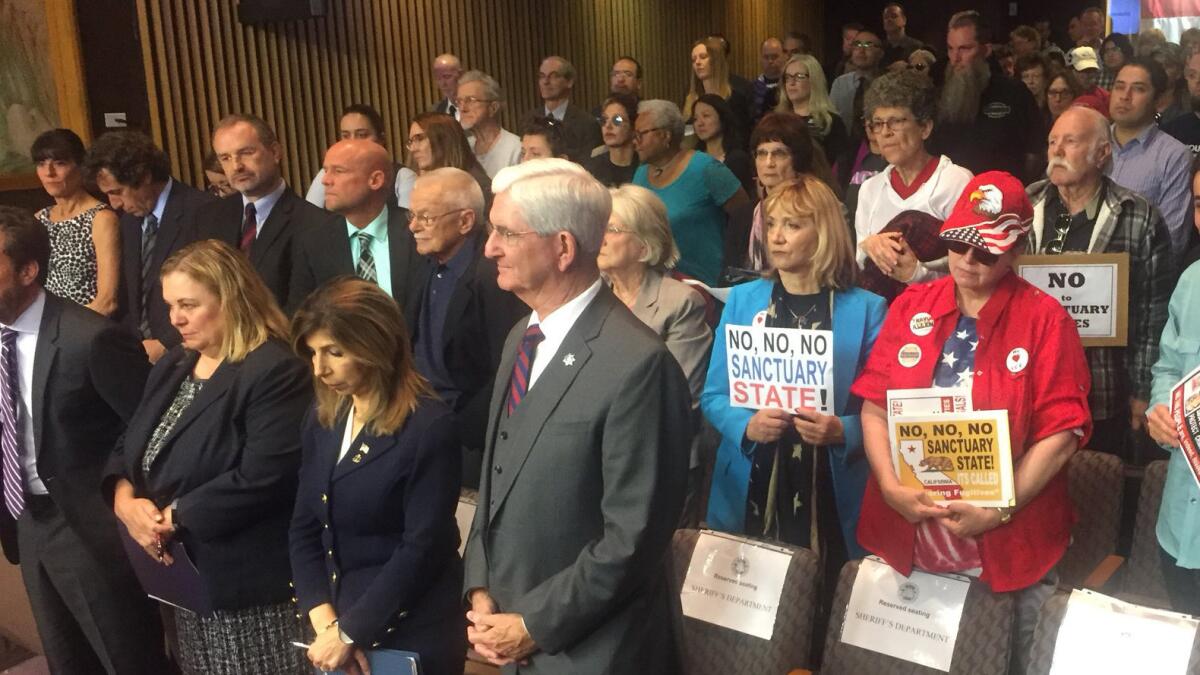San Diego County supervisors vote 3-1 to support the Trump lawsuit against California sanctuary laws

- Share via
The San Diego County Board of Supervisors voted 3-1 Tuesday to support the Trump administration’s lawsuit against California over so-called sanctuary laws that the state passed last year to limit its role in immigration enforcement.
The county will file an amicus brief at the first available opportunity, likely if and when the case moves to a higher court on appeal, said Supervisor Kristin Gaspar, chairwoman of the board.
The board voted in closed session after 45 minutes of public comment in which most speakers in the packed chambers urged the supervisors to vote against supporting the lawsuit.
Margaret Baker, who lives near the border, told the board that backing the lawsuit will discourage immigrants from reporting crime.
“We see this lawsuit as an attack on our safety and the well-being of our community,” she said.
David Garcias, president of the San Diego chapter of the union that represents county government employees, told the supervisors, “I believe you’re on the wrong side of history. This will affect your legacy.”
The three supervisors who voted to support the lawsuit said it was about public safety.
“We’re talking about people who are crossing the border illegally, coming into this county and committing a crime and them being let loose probably to commit another crime,” said Dianne Jacob, supervisor for the district that covers East County. “That creates a public-safety issue and creates a problem in our neighborhoods.”
She worried about terrorists crossing the border illegally, she said.
“This is a different day than it was 20, 30, 40 years ago,” Jacob said. “That’s why it was important for us to stand up, as controversial as it was.”
Gaspar said San Diego was safer before the new laws, specifically Senate Bill 54, went into effect. SB 54 limits the ways in which local law enforcement officers can interact with federal immigration officials.
“The status quo was safer in San Diego,” she said, adding that now immigration officers make more arrests out in the community because they can’t make those arrests at jails. “The best place for ICE to be is in the jail and not out in the community.”
During the announcement of the vote, Gaspar showed printouts of emails she received from each side of the debate. The stack of emails criticizing her for considering support for the lawsuit was not much thicker than a legal pad. The stack of emails asking her to support the Trump administration’s legal challenge was more than a foot tall.
Gaspar, Jacob and Supervisor Bill Horn, who represents the northernmost part of the county, voted to support the lawsuit. Supervisor Greg Cox, whose district covers the South Bay, voted against it. Supervisor Ron Roberts, who represents central San Diego, was traveling abroad and did not attend the meeting.
Cox said immigration issues need to be solved in Washington.
“The board’s vote is a largely symbolic move that will create fear and divisiveness in our region, waste taxpayer funds and create distrust of law enforcement and local government within many communities,” Cox said.
The Department of Justice filed the lawsuit against California at the beginning of March over three laws.
SB 54, the law that received the most publicity when it passed, allows officers to turn unauthorized immigrants over to federal immigration enforcement agencies only if they have committed crimes listed in the legislation. It says local police cannot participate in task forces that are focused on immigration enforcement.
It also requires the California attorney general to set policies limiting assistance with immigration enforcement at public schools, libraries and hospitals.
Assembly Bill 103 prohibits local governments across California from adding new contracts with the federal government for civil immigration detention or expanding old ones. It also requires the California Attorney General’s Office to monitor conditions in existing immigration detention facilities in the state.
AB 450 prohibits employers from voluntarily allowing immigration officials into non-public areas of the workplace unless the officers have judicial warrants. It also requires employers to notify employees about upcoming immigration inspections.
Several critics of the lawsuit cited a January 2017 study by UC San Diego professor Tom Wong, published by the Center for American Progress, that found crime rates are higher in non-sanctuary counties. (Asked about the study, Gaspar declined to comment, saying she hadn’t seen it.)
About a dozen people who spoke in support of the lawsuit told supervisors that the sanctuary laws were an overreach of state power and were concerned that they would inhibit the federal government from deporting people with criminal convictions.
Stella May told the board that “the laws act to protect criminal illegals.”
She used the example of Kate Steinle, a case often cited by President Donald Trump and his supporters in arguing for tougher immigration restrictions. Steinle, 32, was fatally shot by a man who had been released from a San Francisco jail a few months earlier and had several previous deportations.
Cyrus Hojjaty, a 25-year-old Las Vegas resident whose family is from Iran, said that California’s policies were “embarrassing” and “disgusting.” He said his parents “did it the right way.”
He worried that his state’s border with California would mean those policies have an effect where he lives.
“You go to Europe, they’re being flooded with non-whites,” he said.
Before the Board of Supervisors meeting, opponents of the proposal to support the lawsuit rallied outside the county building.
At the rally, many called on San Diegans to vote the supervisors out of office if they agreed to support the proposal.
They worried that allowing local police to work closely with federal immigration officials would make communities less safe.
“This proposal is only about fear and hatred,” Neal José Wilkinson, a priest at a Barrio Logan church, told the crowd outside the building. “We need law enforcement to protect all of our people, regardless of immigration status. If they’re not protecting all of us, they’re not protecting any of us.”
Ismahan Abdullahi of the Partnership for the Advancement of New Americans said San Diego’s strength is its diversity.
“Led by our values, we want to take our region forward, not backward,” Abdullahi said.
Many accused Gaspar of bringing the issue to a board vote to gain media attention for her campaign in the 49th Congressional District, a seat being vacated by Rep. Darrell Issa, R-Vista. Gaspar represents supervisorial district 3, which stretches from Miramar to Encinitas and Escondido.
Inside the board chambers, Milad Torabi, a member of San Diego Border Dreamers, told the supervisors that immigrant communities are “the eyes and ears” for local police.
He argued that SB 54 does not prohibit immigration officials from detaining people who have committed crimes, but rather holds federal officials to law enforcement standards that local police have, like the requirement of a judicial warrant.
Some criticized support for the Trump administration’s lawsuit as “racist,” while others pointed out that despite San Diego’s diverse population, none of the supervisors are people of color.
Still others told the supervisors that a “yes” vote would be on the wrong side of history and asked them what legacy they wanted to leave behind.
The city of Escondido voted to support the Trump administration’s lawsuit earlier in April. Orange County supervisors also decided to join the federal lawsuit.
Immigration Videos


When children are separated from their parents at the border, here is where they go next

Prospects of a deal for 'Dreamers' may hinge on separating Trump from hard-liners on his staff

What is DACA?

Border wall prototype contractors selected

Video: Ukrainian boxer wins asylum in U.S.

30 apprehended after Border Patrol agents discover tunnel

Video: Kurdish diaspora prepare to vote on independence
Follow me on Facebook for live updates about immigration news
kate.morrissey@sduniontribune.com, @bgirledukate on Twitter
More to Read
Sign up for Essential California
The most important California stories and recommendations in your inbox every morning.
You may occasionally receive promotional content from the Los Angeles Times.













